- Home
- Diana Wynne Jones
Caribbean Cruising Page 21
Caribbean Cruising Read online
Page 21
What about different types of magic? There are both different types of magic and different levels of proficiency. Enchanters’ magic is ten times stronger than witches’ magic. But saying a spell, however powerful you are, is not the only way of getting things done. For true style and elegance, even Chrestomanci takes his hat off to the Casas Montana and Petrocchi in The Magicians of Caprona. With a passion that could only be Italian, their magic is not spoken but sung. Both families are spell-makers, as well as spell-users, and in the way that saying a spell incorrectly can lead to the wrong result, if you were to sing a wrong note in a Montana or Petrocchi spell, you could end up turning a member of your family green by mistake.
But it’s not just what you say or how well you sing that makes for a successful spell — it’s how you apply it. As any good magic user knows, it’s useful to have the bare essentials in the cupboard to help you apply your magic. Depending on your speciality, these essentials may include: newts’ eyes, snakes’ tongues, or bull’s-eyes; cardamom, hellebore, or mummy nitre. If you’re feeling particularly wicked (and you don’t mind breaking the law), a jar of dragon’s blood (fresh or dried) will ensure that any spell you are preparing goes off with a bang. These ingredients can all be bought (legally or illegally) from Purveyors of Exotic Supplies.
But the bare essentials can’t help you if you don’t know how to think on your feet and apply your magic skills creatively. When faced with a sticky situation, like a marauding army for example, it’s handy to be flexible. In true Italian style, Rinaldo Montana’s spell-making speciality in The Magicians of Caprona is sweet-smelling love charms, but that doesn’t mean he can’t apply his skills to conjure up a cowpat surprise when cornered by an adversary. Similarly, the gardeners in The Lives of Christopher Chant conjure giant cactus plants, ten-foot nettles, thistles, and poison ivy to repel some rather unpleasant characters — while the cook does something unspeakable with rotten steaks and mouldy soufflés.
Whatever circumstances you find yourself in, it’s important to remember that magic must be respected. Whether you are changing a person into a toad, tampering with world order, or simply tidying up a bit of homework — having the responsibility to use magic wisely is the greatest power of all.
CHRESTOMANCI CASTLE
AS A NINE-LIFED enchanter with the most powerful job in the related worlds, it is only right and proper that Chrestomanci resides in a place that is as grand and imposing as his title — and Chrestomanci Castle is most certainly grand and imposing. If driving from the local railway station, you first glimpse this marvellous building at the top of a hill as you approach along the narrow, winding road. You sweep through massive gates into an avenue of dark green cedars and elm trees, before scrunching to a halt on the gravel outside one of the castle’s many entrances.
Nestled in the heart of the English countryside, Chrestomanci Castle’s history stretches back beyond most people’s memory. Parts of it are very old; it has been extended and expanded over the years so that its appearance is unlike any other castle you have seen before. Part of it is gray and turreted and every bit the medieval-style fortress you might imagine; yet turn a corner and you will come across a bright new part, more like a palace or a mansion, with a spread of windows and a flag fluttering from the roof. (Architecturally, Michael Saunders would probably tell you it is a very interesting mix indeed — but it’s probably not wise to ask him about it unless you have two or three hours to spare.)
The interior of Chrestomanci Castle is as impressive as the outside. If you enter through the main front doors, you will find yourself in an airy entrance hall with a pentagram installed in the tiled floor. Topping this lofty space is a domed glass roof, from which hangs the most magnificent sight in the entrance hall, an enormous crystal chandelier. A majestic pink staircase curls up to the next level. Several doorways topped with statues lead off from the hall; the door to the most important room is topped with a clock as well as a statue.
If you enter Chrestomanci Castle from one of the side doors, you will be confronted by a choice of stairs, corridors, doors, and more stairs. There is soft green carpet everywhere, flanked by highly polished wooden floors. Corridors, doors, more stairs. It is — no other way to describe it — a maze. In fact, to all but the very longest-serving members of the household, navigating Chrestomanci Castle is a most confusing challenge!
Of course, there is yet another way to enter Chrestomanci Castle — by magic. You will probably land in the centre of the tiled pentagram in the main hall. It’s best to make sure that you are definitely invited if you plan to pay a visit in this way, as otherwise you are likely to be caught in a particularly uncomfortable security device.
It is impossible to count all the rooms in Chrestomanci Castle. There are hundreds and hundreds, and even the resident Chrestomanci is unlikely to know exactly how many or even to have visited them all. There are the sorts of rooms you would expect to find in a castle, such as a huge dining room, and Large and Small Drawing Rooms (both massive). There are more unusual rooms too, such as the magician’s workshop. There’s an enormous library, which boasts a copy of every book in the world — and many more from other worlds as well.
If guests come to stay, there are plenty of bedrooms to choose from, each with its own bathroom. Some of the more interesting bedrooms are in the older, turreted part of the castle. Here, the rooms are round and the walls are nearly three-feet thick. If you kneel on one of the deep window seats and look out, you will see a breathtaking view of the castle grounds, with its smooth green lawns, immaculate flower gardens, and splendid orchards. If you look carefully, you might even get a glimpse of Chrestomanci’s private, walled garden. But don’t try and go there without his permission — you will probably find yourself somewhere else altogether!
Chrestomanci himself tends to influence the atmosphere of the building. In Gabriel De Witt’s day, Chrestomanci Castle was very businesslike and efficient — definitely the headquarters of a powerful magic task force! Then, later, when Gabriel realised the value of identifying and harnessing talent at an early age, it was opened up as an academy for children with magical abilities.
When Christopher Chant became Chrestomanci, the everyday business of policing magic carried on, with the invaluable help of his wife, Millie (also a powerful enchantress). But the arrival of two magical children of their own (Roger and Julia) and the adoption of two more (Eric and Gwendolen) meant that part of the castle was transformed into a family home.
The thing that everyone notices when they go to Chrestomanci Castle is the calm, quiet atmosphere everywhere, as if it were cloaked in a blanket of cotton wool. This is, of course, magic, for the whole building is suffused in it. Visitors who are up to no good feel very uncomfortable as the castle works on them, but if you live there for a while you gradually absorb what you need to help you deal with your own sort of magic.
When it’s time to leave Chrestomanci Castle, you’ll probably be quite sad to go. But a word of warning — don’t try to take any souvenirs with you unless they have been specifically given to you as gifts as they tend to protest in VERY LOUD VOICES!
THE IMPORTANCE OF CATS
ALL SORTS OF CREATURES are found linked with magic. Sometimes this is because they are, by nature, magical beasts — such as dragons and unicorns and griffins. Sometimes they are enchanted humans — frogs and toads, in the main. Sometimes they are ingredients — usually of the multi-legged, creepy-crawly variety. The entire animal is not always required — i.e., hair, claws, or whiskers will often do just fine.
The animal that crops up time and time again in the worlds of Chrestomanci, and particularly in connection with witches, is the cat. One of the prime reasons cats are such magical creatures is because they have nine lives. As Chrestomanci has to be a nine-lifed enchanter, it stands to reason that any creature with the luck, gifts, and abilities of nine lives is going to be far more magical than a creature with just one! Which means tha
t all cats are magical, even though their owners are probably not.
Knowing this makes cats extremely confident and self-sufficient, and they put their magic to use all the time. How else could they appear from nowhere whenever the fridge door is opened? Or make a human open a door or window for them when they have a perfectly good cat flap of their own? Or seek out and snuggle up to the one person in the room who hates cats?
Most of the time, cats don’t waste their energy displaying their superiority to non-magical humans. Occasionally they will, however, try to communicate with them — perhaps by staring at their subject for a very long time, or by sitting/standing/sleeping on whatever book/newspaper/homework that person might be occupied with, or by massaging that person’s leg/stomach/shoulder with very spiky claws while purring loudly.
Cats tend to behave in the same way regardless of whether they live in a world with a lot of magic or a world with none. But in worlds that use magic every day, cats can be extremely useful — if they can be persuaded to help at all. Of course, it’s a great advantage if you can understand cats; not everyone can — not even every magic user can. (In fact, we learn that not even Chrestomanci can understand cats in The Magicians of Caprona — although he knows how to communicate in the proper manner.)
It’s therefore not surprising that Tonino Montana gains much respect from his friends and family when Benvenuto — boss cat of the Casa Montana — takes Tonino under his wing. Benvenuto knew that all Tonino needed was a bit of help in learning how to use his special kind of magic — and the fact that Tonino also knows exactly the right way to scratch a cat behind the ears is just a big feline bonus! No doubt similar reasons brought Angelica Petrocchi and Vittoria together in the rival Casa Petrocchi household.
In some worlds, cats are so magical that they are sacred. The Temple of Asheth in Series 10, for example, is positively swarming with magical cats. The Goddess usually adopts a favourite as a companion and to aid her in her reading of portents. In The Lives of Christopher Chant, the Goddess’s cats were Bethi, succeeded by Proudfoot.
Asheth Temple cats all have exceptionally strong personalities — the strongest being that of Throgmorten. No cats suffer fools gladly, but Throgmorten is probably the least tolerant of all and has no hesitation about venting his feelings with his razor sharp claws, lethal fangs and lightning quick reflexes. Throgmorten is a very handy ally in a fight against a deadly foe, but is not averse to ambushing innocent bystanders if he doesn’t like them!
Some cats are not what they appear to be. Fiddle, in Charmed Life, was actually once a violin (hence the name). But never make the mistake of thinking that an enchanted cat is any less important or magical than a cat that grew up from a kitten — he may well have a vital role to play as all magic happens for a reason.
The best advice for dealing with cats is:
Always greet them politely.
Don’t make an unnecessary fuss over them.
Be on the alert for signs they want to communicate with you.
Never, ever laugh at them!
If you’re lucky, you might just find that your cat will decide that you are a magical person worthy of attention. Or then again, maybe they’d just like some fish. . .
THE WILLING WARLOCK
WHAT WAS LIFE like for the Willing Warlock before he had his magic removed by Chrestomanci? We first meet him in Charmed Life, practising in Wolvercote, the hometown of Cat and Gwendolen Chant. Magic users like to cluster together, and Coven Street, where the Willing Warlock lives, boasts Accredited Witches, Necromancers, Soothsayers, Fortune-tellers, Sorcerers and Clairvoyants. If you’re looking for the Willing Warlock, just smell the air. If it is heavy with the scent of magic being done, you’re in the right place.
But if there is a scale for magical skill, the Willing Warlock is at the bottom. Having the ability to grow his fingernails into claws and his teeth into fangs is one thing; being able to take on Chrestomanci is quite another. Always unshaven, always ready to present passing ladies with a bull’s-eye, the Willing Warlock chooses his friends unwisely, and suffers the consequences of being on the wrong side of the law. Chrestomanci may have taken the Willing Warlock’s magic away, but nothing can be done to cure his stupidity!
ONEIR
WHERE DOES CAROL Oneir’s interesting taste for literature come from, and what is her connection with Chrestomanci? The answer to both questions is: her father. Carol’s father, always referred to as “Oneir,” is an old school friend of Christopher Chant. When Oneir, Fenning, and Christopher meet on the train taking them to Penge School, Surrey, in The Lives of Christopher Chant, even Fenning’s frequent bouts of being sick out the train window cannot stop them becoming firm friends. Although they call themselves the “Terrible Three,” they are known at school as the “Three Bears” because Christopher is tall, Fenning is small, and Oneir is comfortably in the middle.
When Christopher finds he is no good at magic, it is Oneir who does Christopher’s magic homework — in return for Christopher’s doing Oneir’s algebra. Oneir also gives Christopher invaluable help on the subject of What Books Girls Like, which includes “all sorts of slush,” such as Little Tanya and the Fairies (much to Christopher’s disgust) and “sure-fire slush,” such as Millie Goes to School; Millie Plays the Game; and Millie’s Finest Hour. But it is on the cricket field where both boys excel — Christopher as a batsman and Oneir as the boy who would like to be a batsman, but who is better at cracking heads than hitting sixes.
TONINO
TONINO MONTANA HAS an English mother, Elizabeth, an Italian father, Antonio, and a very special way of doing magic. One of five children (brother Paolo; sisters Rosa, Corinna, and Lucia), Tonino is from Caprona, Italy, where all the best spells come from because they are not spoken, but sung. The Casa Montana is known as a spell-house and, with the Casa Petrocchi, provides spells for the whole of Caprona and beyond!
Think then, how difficult it is for poor Tonino, when he discovers he is very slow at learning magic, and can only remember spells if he goes over them again and again. Being known as a bookworm because he is never far from an open book, and knowing how to communicate with cats, is no compensation for his lack of magical ability.
It takes a national crisis and the summoning of Chrestomanci to discover that Tonino’s talent is for turning other people’s magic to his own use. So, if, for example, you use magic to summon mice and you get griffins instead, you might suspect that Tonino Montana is not far away, using your spell and making it his own.
THE WORLDS OF DIANA WYNNE JONES:
AN INTERVIEW
HarperCollins: You have stated: “Things we are accustomed to regard as myth or fairy story are very much present in people’s lives.” How much of your stories do you create from the real world as we know it and how much comes from . . . elsewhere?
Diana Wynne Jones: I get a lot of things from the real world — people, particularly. If you annoy me, watch out! I shall put you in a book as a baddie and then make people laugh at you. But as soon as the story gets moving, it takes over. It does its own thing. I don’t feel as if I’m imagining it, or making it up, at all. It just sort of happens — in other worlds.
HC: While you write, do you become absorbed in these other worlds? How did you find these worlds originally?
DWJ: I wish I knew how I found the different worlds of Chrestomanci. They just jumped into my head. Caprona, for instance, appeared in my head just as it is in the book — complete with its magicians and its Duke — while I was listening to a piece of music. It may be real somewhere. A man wrote to me a couple of years ago and said he was the Count of Caprona. The world of the Goddess came into my head a long time before I wrote the book, so complete and so full of its own smells and sounds and feelings that I was positive it had to exist somewhere. Perhaps I did really look through into another set of dimensions for a short while. When I write about any of these places, it is like
I am living there. Then I look up and it’s raining outside and I wonder where I am.
HC: The Chrestomanci novels are set in different places and at different times, introducing new characters and situations with each story. Yet they all exist in this parallel world. How would you recognise which world you are in?
DWJ: What you would notice first if you went to the world of Chrestomanci is that everything is about a hundred years behind ours in terms of look. There is electric light, but there are very few cars. People dress in an old-fashioned way — including Chrestomanci himself. In this world people are used to doing by magic what we do by science. Of course, you would notice the magic — it would sizzle on your skin. Witch Week takes place in a different world from the other three, but all worlds are parallel to this one of ours. Now, if you find yourself in the world of Witch Week, be careful. If you appear suddenly, they might arrest you as a witch. And they burn witches there.
HC: On that note, what advice — survival tips — would you give to someone who wound up in one of these worlds?
DWJ: If you suddenly find yourself in any of these other worlds, watch out for magic. All of them have much more magic than we do. If you want to pass for a native, don’t look surprised if witches on broomsticks sail across the moon, or a cat speaks to you. And never make an enchanter angry. He can turn you into a frog.
HC: Finding oneself the guest at Chrestomanci Castle must be a daunting experience. What is the best way to behave? How would you describe the great enchanter himself?
DWJ: Manners are much more stately in Chrestomanci Castle, so you have to be polite. Otherwise you can behave perfectly naturally. Chrestomanci knows that everyone is only human. He is only human himself, but you may not believe this when you see him in one of his dressing gowns. He looks as regal as any king, but he has this sarcastic way of speaking — which takes getting used to.

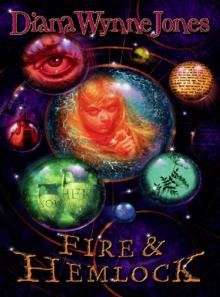 Fire and Hemlock
Fire and Hemlock Reflections: On the Magic of Writing
Reflections: On the Magic of Writing The Game
The Game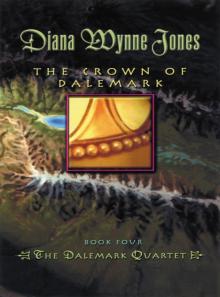 The Crown of Dalemark
The Crown of Dalemark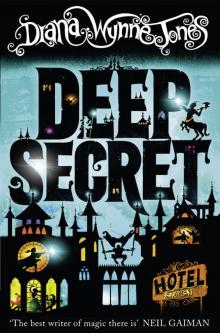 Deep Secret
Deep Secret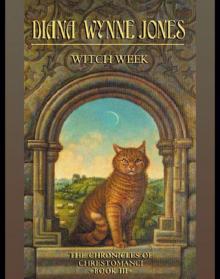 Witch Week
Witch Week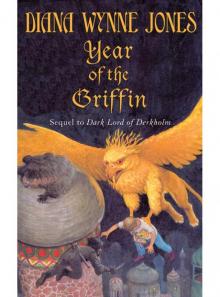 Year of the Griffin
Year of the Griffin Wild Robert
Wild Robert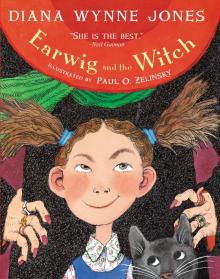 Earwig and the Witch
Earwig and the Witch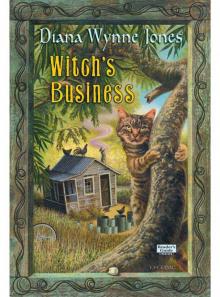 Witch's Business
Witch's Business Dogsbody
Dogsbody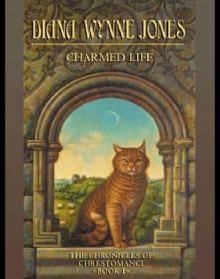 Caribbean Cruising
Caribbean Cruising Cart and Cwidder
Cart and Cwidder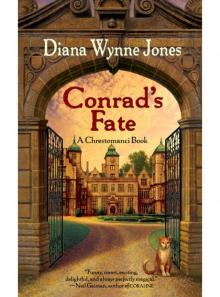 Conrad's Fate
Conrad's Fate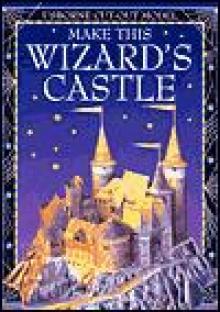 Howl's Moving Castle
Howl's Moving Castle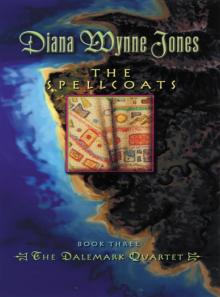 The Spellcoats
The Spellcoats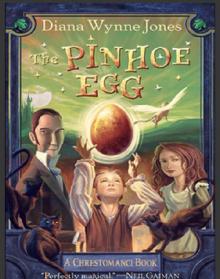 The Pinhoe Egg
The Pinhoe Egg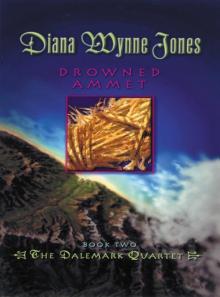 Drowned Ammet
Drowned Ammet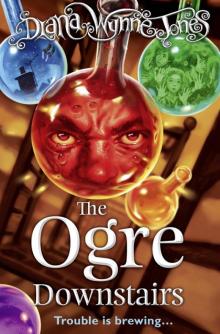 The Ogre Downstairs
The Ogre Downstairs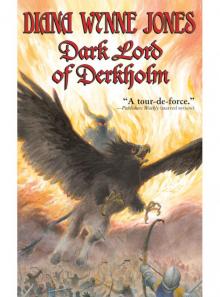 Dark Lord of Derkholm
Dark Lord of Derkholm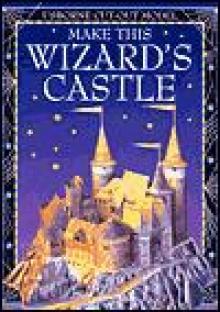 Castle in the Air
Castle in the Air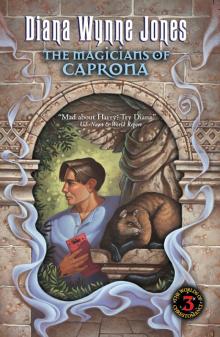 The Magicians of Caprona
The Magicians of Caprona A Tale of Time City
A Tale of Time City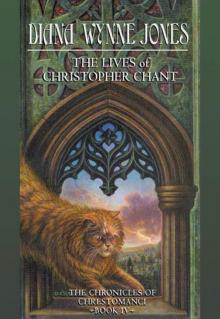 The Lives of Christopher Chant
The Lives of Christopher Chant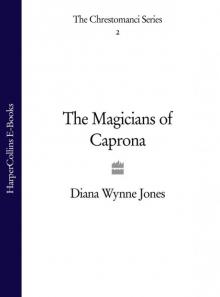 The Magicians of Caprona (UK)
The Magicians of Caprona (UK)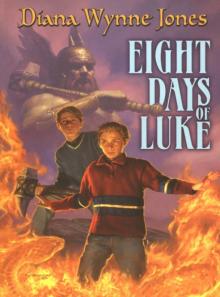 Eight Days of Luke
Eight Days of Luke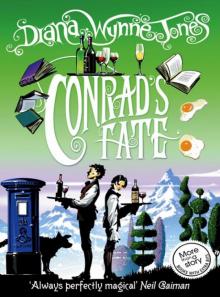 Conrad's Fate (UK)
Conrad's Fate (UK) A Sudden Wild Magic
A Sudden Wild Magic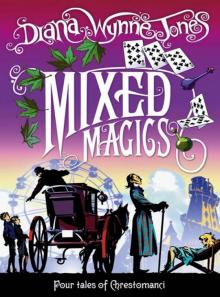 Mixed Magics (UK)
Mixed Magics (UK)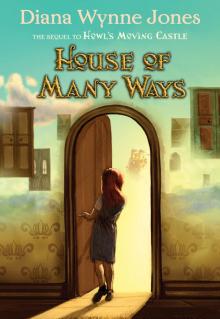 House of Many Ways
House of Many Ways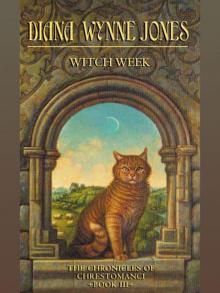 Witch Week (UK)
Witch Week (UK) The Homeward Bounders
The Homeward Bounders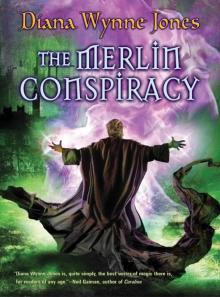 The Merlin Conspiracy
The Merlin Conspiracy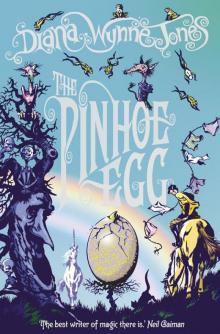 The Pinhoe Egg (UK)
The Pinhoe Egg (UK)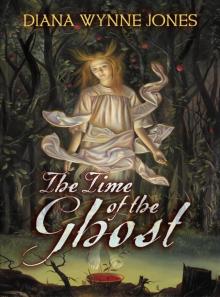 The Time of the Ghost
The Time of the Ghost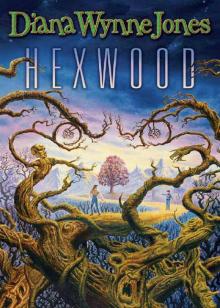 Hexwood
Hexwood Enchanted Glass
Enchanted Glass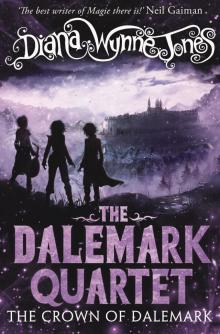 The Crown of Dalemark (UK)
The Crown of Dalemark (UK)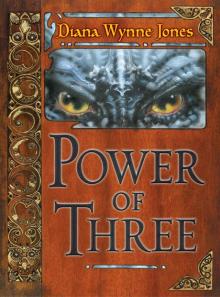 Power of Three
Power of Three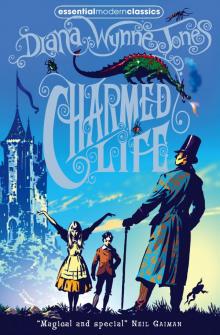 Charmed Life (UK)
Charmed Life (UK)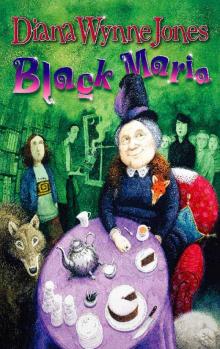 Black Maria
Black Maria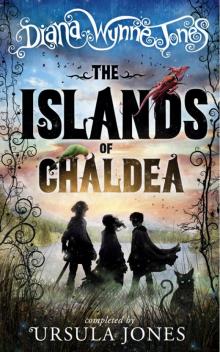 The Islands of Chaldea
The Islands of Chaldea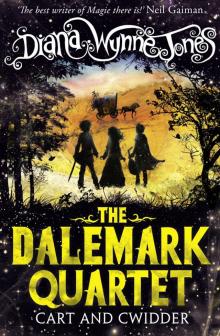 Cart and Cwidder (UK)
Cart and Cwidder (UK)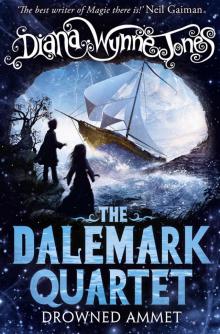 Drowned Ammet (UK)
Drowned Ammet (UK)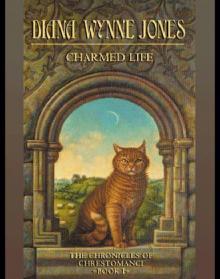 Charmed Life
Charmed Life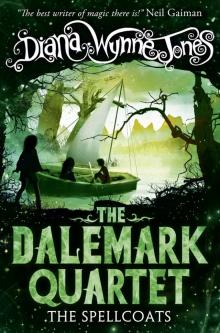 The Spellcoats (UK)
The Spellcoats (UK)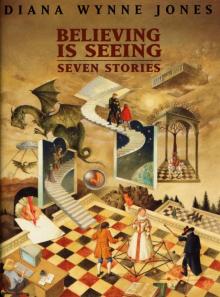 Believing Is Seeing
Believing Is Seeing Samantha's Diary
Samantha's Diary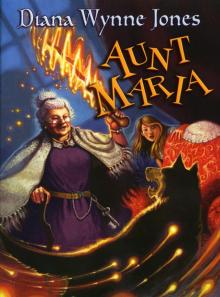 Aunt Maria
Aunt Maria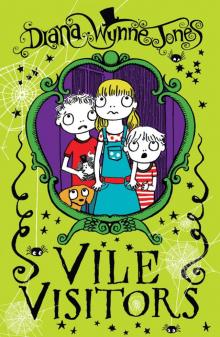 Vile Visitors
Vile Visitors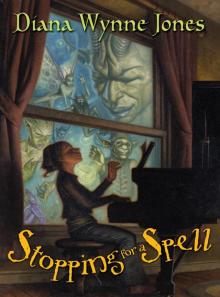 Stopping for a Spell
Stopping for a Spell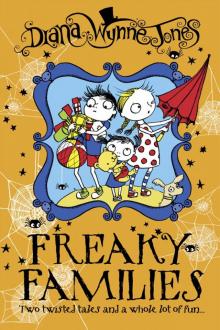 Freaky Families
Freaky Families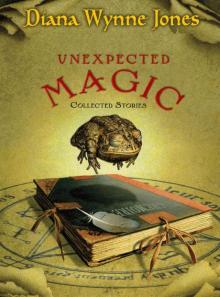 Unexpected Magic
Unexpected Magic Reflections
Reflections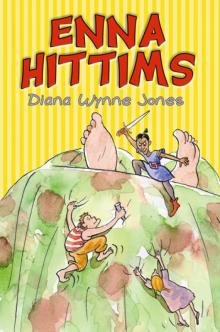 Enna Hittms
Enna Hittms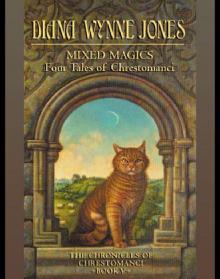 Mixed Magics: Four Tales of Chrestomanci
Mixed Magics: Four Tales of Chrestomanci